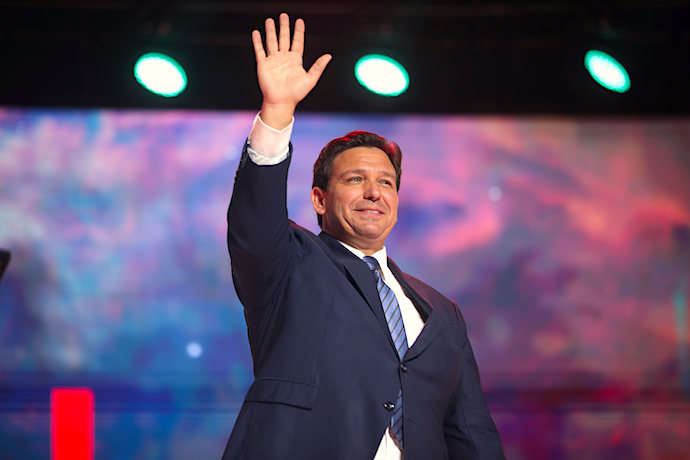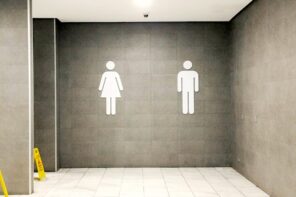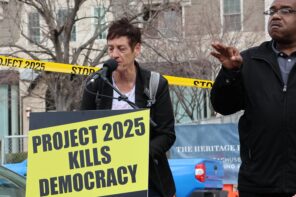We’re not used to thinking of Ron DeSantis, Florida’s rabidly culture-warring governor and a possible 2024 frontrunner for the Republican presidential candidate, as a Catholic politician. He clearly is one, although documenting the ins and outs of how DeSantis’s faith intersects with his politics requires digging much deeper than coverage in the legacy media or cable news. As a child, DeSantis, a descendant of Italian immigrants, attended Our Lady of Lourdes Catholic School in Dunedin, Florida. As an adult, he remains Catholic enough not only to have his son baptized with water from the Sea of Galilee, but also to emphasize “the power of prayer” in public settings.
DeSantis attends political prayer breakfasts where he calls Communism “an evil ideology” because Communists “rejected the existence of God himself. They viewed the state as supreme.” In addition, DeSantis’s social policy agenda appears to be directly influenced by the lobbying of Catholic bishops, and he’s placed hardline Catholic ideologues affiliated with the Catholic Medical Association, the National Catholic Bioethics Center, and other right-wing organizations in key bureaucratic and “expert” roles, politicizing and abusing the state bureaucracy in pursuit of a far-right agenda targeting transgender people. (Those seeking more information about the anti-trans Catholic connections in Florida should take a look at the well-sourced Twitter threads of Zinnia Jones, who’s been tirelessly documenting the ties.)
Clemente Lisi, a New York-based journalist and college instructor who contributes frequently to GetReligion, argues that the media’s failure to represent DeSantis as a politician moved by Catholic convictions represents problematic bias. Lisi is currently affiliated with The King’s College—a nondenominational evangelical school owned by Campus Crusade for Christ (since rebranded as “Cru”) until 2010 and headed by Dinesh D’Souza until 2012—and GetReligion, an outlet with a strong bias in favor of conservative Christians.
Clearly, there’s little reason to think that someone like Lisi and someone like myself, an exvangelical atheist and political progressive, would agree on much of anything. And yet I agree that it’s a problem that our national discourse papers over the devout Catholicism of politicians like Ron DeSantis while playing up the devotion of liberal Catholics like President Joe Biden and Speaker of the House Nancy Pelosi, because DeSantis “is the wrong kind of Catholic,” as Lisi testily puts it.
As Lisi points out, only when journalists can portray DeSantis as being at odds with Catholic teaching they seem to approve of do they bring his Catholicism up—for example, when DeSantis clashes with a local bishop over his anti-immigrant stance, or when his stance in favor of the death penalty, which clashes with official Catholic teaching, is in the spotlight.
Of course, liberal Catholic politicians clash with the hierarchy too—on abortion access, birth control, and LGBTQ inclusion—and yet journalists show little interest in impugning their Catholic bona fides, instead portraying politicians as heroic for standing up against pressure from the Catholic Church.
My reasons for caring about the evident double standard here seem to differ sharply from Lisi’s. As far as I can tell, Lisi wants to highlight DeSantis’s right-wing Catholicism because he believes it should be acknowledged as a legitimate source of influence in American politics. For my part, it’s my strong conviction that religious beliefs should be allowed no influence whatsoever on policy that undermines equal accommodation in the public square for people who do not share those beliefs. Nor should they shape anyone’s ability to access the best healthcare they need in a given situation, to adopt children, or to marry.
This isn’t merely theoretical to me. Although I cannot get pregnant, being queer is enough to deter me from seeking healthcare in a Catholic or Protestant hospital when at all possible, since I can’t trust doctors beholden to Christian dogma to care for me appropriately. Catholic hospitals, whose standards of care in matters of sexual. gender, and reproductive health are determined by the reactionary United States Conference of Catholic Bishops, currently treat one in seven hospital patients in the United States, and their share of control over hospital systems in the United States only continues to grow.
In terms of practical matters, being transgender means there are restrictions on where I can live and what health insurance companies I’m able to use in order to ensure that my care takes place within a secular system of clinics and hospitals, where I don’t risk being misgendered, shamed, or denied a necessary treatment on the basis of bigoted religious beliefs I find frankly deplorable.
Today in Florida, Ron DeSantis is successfully imposing Catholic strictures on both reproductive healthcare and transgender healthcare on every medical institution and medical practitioner throughout the state, regardless of their own beliefs and whether they run directly counter to well-established medical best practices. Not to put too fine a point on it, this is exactly why I object to the media’s differential treatment of liberal Catholic politicians and right-wing Catholic politicians.
Journalists’ and editors’ pervasive framing choices in this regard both reflect and perpetuate the too-little acknowledged Christian privilege that permeates American civil society. They do so by equating “Christian” with “good”; in this case via associating political leaders’ Catholic affiliation with policy positions that promote equality and human rights, even if they are occasionally critical of the Catholic hierarchy. The issue here is thus related to the problem of dismissing authoritarian Christians as “fake Christians,” a topic I’ve written about many times before.
While liberationist forms of the faith certainly do exist, most of Christian history is characterized by imperialism, colonialism, and a drive to exert dominance and control over people’s personal lives. In a certain sense, Catholicism, which contains both social justice strands and reactionary strands, is the ultimate “big tent” within the larger social and cultural system that is Christianity.
But the existence of social justice impulses within Catholicism doesn’t negate the existence of authoritarian impulses within the church, to say nothing of the harm those authoritarian impulses lead to. Christianity isn’t remotely always or inherently benign. If we’re going to be honest about the current state of American politics, we have to face that fact. One concrete way to start is to acknowledge that Ron DeSantis is every bit as Catholic a politician as Joe Biden.





